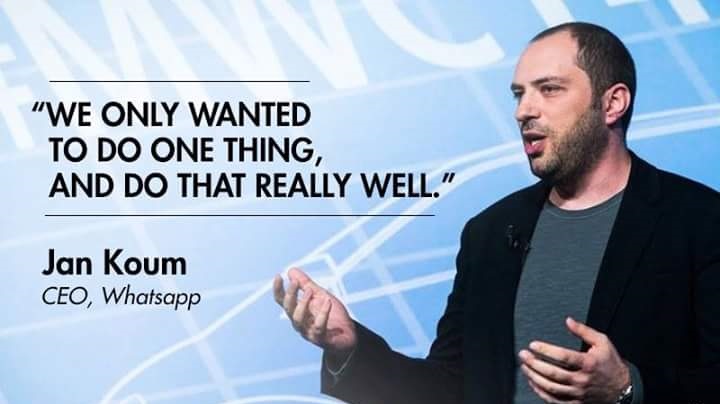The inspirational stories of fight against odds, unbelievable struggle and extraordinary success are always popular. But few stories make the space that can not be occupied by others. Few stories become inspiration for generations.
Facebook founder Mark Zuckerberg was the son of an upper-middle-class dentist. Bill Gates was a millionaire before he started Microsoft in 1975. Google founder Larry Page’s parents were both professors; Google co-founder Sergey Brin’s father was a professor and his mother was a NASA researcher. But the man we are talking about is the only son of a construction labourer.
The story of 39 year old Jan Koum(as of 2015), is inspiration for the current generation on internet entrepreneurs. A man who did not have hot water facility at his home, the man who cleaned the floors of a grocery store at the age of 16, the man who stood in the que for collecting food stamps, is now a Silicon Valley badshah.
He owns an asset of more than rupees “430000000000”, as of May 2015. It is U.S. $ 6.8 billion which accounts to more than rupees 43 thousand crore Indian Rupees.
Jan Koum is man behind a product used by 800 million users( as of April 2015) globally. He is the man behind the most popular messaging app “WhatsApp Messenger”.
The story of Jan Koum is worth reading and learning. Jan was born and raised in a village on the outskirts of Kiev, Ukraine. He was the only child to his parents, his mother was a housewife and father was an ordinary construction labourer.
He belonged to a family miles away from technical innovations and science. His family rarely talked on phone because they believed that phone are recorded by the state(government). Jan practically had nothing to ignite his passion for technology.
Koum once said to Forbes “he still pines for the rural life,” he told Wired that life was rough: “It was so run-down that our school didn’t even have an inside bathroom,” he said. “Imagine the Ukrainian winter, -20°C, where little kids have to stroll across the parking lot to use the bathroom. Society was extremely closed off: you can read 1984, but living there was experiencing it.”
Prompted by the unstable political environment in Ukraine — students were regularly questioned for mocking politicians in class — and increasing anti-Semitism in the Ukraine, Koum and his mother moved to Mountain View, California, when he was 16. Short on cash, the two stayed in a modest two-bedroom apartment on government assistance. Koum’s father, who died in 1997, never made it to Mountain View. Koum’s mother worked as a babysitter to make ends meet, while he swept the floor of a grocery store. Later, when his mother was diagnosed with cancer, they lived off her disability payments. (Koum’s mother died in 2000.)

An indifferent student, Koum, who didn’t have a computer until age 19, taught himself computer networking from a manual he bought at a used bookstore and later returned. Koum attended San Jose State University and worked part-time as a security tester for accounting firm Ernst & Young. Part of the work involved inspecting Yahoo’s advertising system, a task that prompted Koum to cross paths with Brian Acton, who later became his business partner.
Koum worked with Yahoo for nine long years, on October 31, 2007, at a saving of $ 4,00,000( appr. Rs.25,00,000 as of May 2015), he thought of of freeing up for some time. In the next one year, he did not do much but the developments in his life paved the path for him.
In 2009, Koum bought an iPhone, he could not use his iPhone in the gymnasium as their policies did not allow it. He started using Skype while in gym but frequently forgot his password. By this time, he had decided to create an app that worked seamlessly on one’s iPhone by using a phone number for identification. Koum convinced Brian Acton and started working on “WhatsApp”.
They both were looking better employment opportunities simultaneously, by this time they both were turned down by Facebook. Brian Acton was turned down by Twitter too.
Around that time, the founders got a small group of former Yahoo employees to pool $250,000 in seed money. Early days were the stuff of startup legend. The company leased space in the same building as Evernote, which later took over the whole space and kicked them out. The office furniture was cheap stuff from IKEA and employees wore blankets when it got cold. In early 2010, WhatsApp was bringing in about $5,000 a month. Things steadily improved until the company’s breakthrough year, 2011, when WhatsApp hit the top 20 in Apple’s App Store.
Since then, there has been no looking back. Till 2014, WhatsApp made such a big impact that Mark Zuckerberg had send a friends request to Koum. Now when Koum is a billionaire, he still has not forgot his past. When he signed the deal with Facebook, he chose the same social services building as the venue where he stood in a queue to collect food stamps.







 Users wear a small sensor around their torso held in place by an elastic strap. The device, which sells for around $180 with a 60-day guarantee, monitors breathing patterns by detecting pressure on the sensor as users inhale and exhale, and the information is relayed to a smartphone using Bluetooth.
Users wear a small sensor around their torso held in place by an elastic strap. The device, which sells for around $180 with a 60-day guarantee, monitors breathing patterns by detecting pressure on the sensor as users inhale and exhale, and the information is relayed to a smartphone using Bluetooth.







